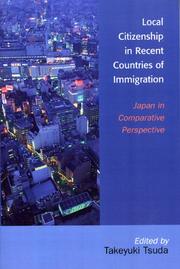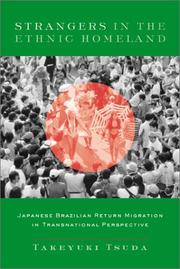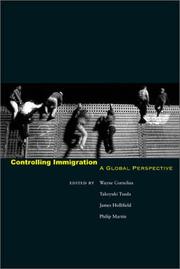| Listing 1 - 10 of 15 | << page >> |
Sort by
|

ISBN: 0739111922 0739111930 9780739111925 9780739111932 0739157256 9780739157251 Year: 2006 Publisher: Lanham, MD Lexington Books
Abstract | Keywords | Export | Availability | Bookmark
 Loading...
Loading...Choose an application
- Reference Manager
- EndNote
- RefWorks (Direct export to RefWorks)
Since the late 1980s, Japan has been experiencing significant levels of immigration primarily from Asian and Latin American countries due to severe domestic labor shortages. Local Citizenship in Recent Countries of Immigration, examines the various dimensions of local citizenship in Japan, with comparative studies from South Korea, Italy, and Spain.
Citizenship --- Emigration and immigration --- Immigrants --- Social integration --- #SBIB:35H431 --- #SBIB:39A6 --- J4208 --- Emigrants --- Foreign-born population --- Foreign population --- Foreigners --- Migrants --- Persons --- Aliens --- Immigration --- International migration --- Migration, International --- Population geography --- Assimilation (Sociology) --- Colonization --- Inclusion, Social --- Integration, Social --- Social inclusion --- Sociology --- Belonging (Social psychology) --- Birthright citizenship --- Citizenship (International law) --- National citizenship --- Nationality (Citizenship) --- Political science --- Public law --- Allegiance --- Civics --- Domicile --- Political rights --- Government policy --- Beleidssectoren: binnenlands beleid en justitie --- Etniciteit / Migratiebeleid en -problemen --- Japan: Sociology and anthropology -- communities -- racial and ethnic -- immigrants --- Law and legislation --- Japan --- Emigration and immigration.
Book
ISBN: 1479834971 1479821780 Year: 2016 Publisher: New York, NY : New York University Press,
Abstract | Keywords | Export | Availability | Bookmark
 Loading...
Loading...Choose an application
- Reference Manager
- EndNote
- RefWorks (Direct export to RefWorks)
Traces the contemporary ethnic experiences of Japanese AmericansAs one of the oldest groups of Asian Americans in the United States, most Japanese Americans are culturally assimilated and well-integrated in mainstream American society. However, they continue to be racialized as culturally “Japanese” foreigners simply because of their Asian appearance in a multicultural America where racial minorities are expected to remain ethnically distinct. Different generations of Japanese Americans have responded to such pressures in ways that range from demands that their racial citizenship as bona fide Americans be recognized to a desire to maintain or recover their ethnic heritage and reconnect with their ancestral homeland. In Japanese American Ethnicity, Takeyuki Tsuda explores the contemporary ethnic experiences of Japanese Americans from the second to the fourth generations and the extent to which they remain connected to their ancestral cultural heritage. He also places Japanese Americans in transnational and diasporic context and analyzes the performance of ethnic heritage through the example of taiko drumming ensembles. Drawing on extensive fieldwork with Japanese Americans in San Diego and Phoenix, Tsuda argues that the ethnicity of immigrant-descent minorities does not simply follow a linear trajectory. Increasing cultural assimilation does not always erode the significance of ethnic heritage and identity over the generations. Instead, each new generation of Japanese Americans has negotiated its own ethnic positionality in different ways. Young Japanese Americans today are reviving their cultural heritage and embracing its salience in their daily lives more than the previous generations. This book demonstrates how culturally assimilated minorities can simultaneously maintain their ancestral cultures or even actively recover their lost ethnic heritage.
Japanese Americans --- Taiko (Drum ensemble) --- Children of immigrants --- First generation children --- Immigrants' children --- Second generation children --- Immigrants --- Percussion ensembles --- Kibei Nisei --- Nisei --- Ethnology --- Japanese --- Ethnic identity. --- Cultural assimilation. --- Social life and customs. --- Racial identity. --- History. --- Race identity --- United States --- Japan --- Ethnic relations. --- Race relations. --- Emigration and immigration. --- Immigration --- Race question
Book
ISBN: 0804772061 9780804772068 0804762740 9780804762748 0804762767 9780804762762 9780804762748 9780804762762 Year: 2009 Publisher: Stanford, Calif. Stanford University Press
Abstract | Keywords | Export | Availability | Bookmark
 Loading...
Loading...Choose an application
- Reference Manager
- EndNote
- RefWorks (Direct export to RefWorks)
In recent decades, increasing numbers of diasporic peoples have returned to their ethnic homelands, whether because of economic pressures, a desire to rediscover ancestral roots, or the homeland government's preferential immigration and nationality policies. Although the returnees may initially be welcomed back, their homecomings often prove to be ambivalent or negative experiences. Despite their ethnic affinity to the host populace, they are frequently excluded as cultural foreigners and relegated to low-status jobs shunned by the host society's populace. Diasporic Homecomings, the first book to provide a comparative overview of the major ethnic return groups in Europe and East Asia, reveals how the sociocultural characteristics and national origins of the migrants influence their levels of marginalization in their ethnic homelands, forcing many of them to redefine the meanings of home and homeland.
Book
ISBN: 9780804762748 0804762740 9780804762762 0804762767 Year: 2009 Publisher: Stanford, Calif. Stanford University Press
Abstract | Keywords | Export | Availability | Bookmark
 Loading...
Loading...Choose an application
- Reference Manager
- EndNote
- RefWorks (Direct export to RefWorks)
In recent decades, increasing numbers of diasporic peoples have returned to their ethnic homelands, whether because of economic pressures, a desire to rediscover ancestral roots, or the homeland government's preferential immigration and nationality policies. Although the returnees may initially be welcomed back, their homecomings often prove to be ambivalent or negative experiences. Despite their ethnic affinity to the host populace, they are frequently excluded as cultural foreigners and relegated to low-status jobs shunned by the host society's populace. Diasporic Homecomings, the first book to provide a comparative overview of the major ethnic return groups in Europe and East Asia, reveals how the sociocultural characteristics and national origins of the migrants influence their levels of marginalization in their ethnic homelands, forcing many of them to redefine the meanings of home and homeland. (Provided by publisher)
Book
ISBN: 9780231502344 Year: 2003 Publisher: New York, NY
Abstract | Keywords | Export | Availability | Bookmark
 Loading...
Loading...Choose an application
- Reference Manager
- EndNote
- RefWorks (Direct export to RefWorks)
Book
ISBN: 9781479834976 1479834971 9781479821785 1479821780 9781479810796 1479810797 Year: 2016 Publisher: New York, NY
Abstract | Keywords | Export | Availability | Bookmark
 Loading...
Loading...Choose an application
- Reference Manager
- EndNote
- RefWorks (Direct export to RefWorks)
Traces the contemporary ethnic experiences of Japanese AmericansAs one of the oldest groups of Asian Americans in the United States, most Japanese Americans are culturally assimilated and well-integrated in mainstream American society. However, they continue to be racialized as culturally “Japanese” foreigners simply because of their Asian appearance in a multicultural America where racial minorities are expected to remain ethnically distinct. Different generations of Japanese Americans have responded to such pressures in ways that range from demands that their racial citizenship as bona fide Americans be recognized to a desire to maintain or recover their ethnic heritage and reconnect with their ancestral homeland. In Japanese American Ethnicity, Takeyuki Tsuda explores the contemporary ethnic experiences of Japanese Americans from the second to the fourth generations and the extent to which they remain connected to their ancestral cultural heritage. He also places Japanese Americans in transnational and diasporic context and analyzes the performance of ethnic heritage through the example of taiko drumming ensembles. Drawing on extensive fieldwork with Japanese Americans in San Diego and Phoenix, Tsuda argues that the ethnicity of immigrant-descent minorities does not simply follow a linear trajectory. Increasing cultural assimilation does not always erode the significance of ethnic heritage and identity over the generations. Instead, each new generation of Japanese Americans has negotiated its own ethnic positionality in different ways. Young Japanese Americans today are reviving their cultural heritage and embracing its salience in their daily lives more than the previous generations. This book demonstrates how culturally assimilated minorities can simultaneously maintain their ancestral cultures or even actively recover their lost ethnic heritage.
Japanese Americans --- Taiko (Drum ensemble) --- Children of immigrants --- Ethnic identity. --- Cultural assimilation. --- Social life and customs. --- Racial identity. --- History. --- United States --- Japan --- Ethnic relations. --- Race relations. --- Emigration and immigration.

ISBN: 023112838X 0231128398 0231502346 Year: 2003 Publisher: New York : Columbia University Press,
Abstract | Keywords | Export | Availability | Bookmark
 Loading...
Loading...Choose an application
- Reference Manager
- EndNote
- RefWorks (Direct export to RefWorks)
Since the late 1980's, Brazilians of Japanese descent have been "return" migrating to Japan as unskilled foreign workers. With an immigrant population currently estimated at roughly 280,000, Japanese Brazilians are now the second largest group of foreigners in Japan. Although they are of Japanese descent, most were born in Brazil and are culturally Brazilian. As a result, they have become Japan's newest ethnic minority. Drawing upon close to two years of multisite fieldwork in Brazil and Japan, Takeyuki Tsuda has written a comprehensive ethnography that examines the ethnic experiences and reactions of both Japanese Brazilian immigrants and their native Japanese hosts. In response to their socioeconomic marginalization in their ethnic homeland, Japanese Brazilians have strengthened their Brazilian nationalist sentiments despite becoming members of an increasingly well-integrated transnational migrant community. Although such migrant nationalism enables them to resist assimilationist Japanese cultural pressures, its challenge to Japanese ethnic attitudes and ethnonational identity remains inherently contradictory. Strangers in the Ethnic Homeland illuminates how cultural encounters caused by transnational migration can reinforce local ethnic identities and nationalist discourses.
Brazilians --- Foreign workers, Brazilian --- Japan --- Ethnic relations.
Book
ISBN: 3319907638 331990762X Year: 2019 Publisher: Cham : Springer International Publishing : Imprint: Palgrave Macmillan,
Abstract | Keywords | Export | Availability | Bookmark
 Loading...
Loading...Choose an application
- Reference Manager
- EndNote
- RefWorks (Direct export to RefWorks)
This book examines Korean cases of return migrations and diasporic engagement policy. The study concentrates on the effects of this migration on citizens who have returned to their ancestral homeland for the first time and examines how these experiences vary based on nationality, social class, and generational status. The project’s primary audience includes academics and policy makers with an interest in regional politics, migration, diaspora, citizenship, and Korean studies. Takeyuki Tsuda is Professor of Anthropology, Arizona State University, USA. Changzoo Song is Senior Lecturer in Korean and Asian Studies, University of Auckland, New Zealand.
Asia-Politics and government. --- Migration. --- Emigration and immigration. --- Comparative politics. --- Ethnicity. --- Public policy. --- Asian Politics. --- Diaspora. --- Comparative Politics. --- Ethnicity Studies. --- Public Policy. --- Ethnic identity --- Group identity --- Cultural fusion --- Multiculturalism --- Cultural pluralism --- Comparative political systems --- Comparative politics --- Government, Comparative --- Political systems, Comparative --- Political science --- Immigration --- International migration --- Migration, International --- Population geography --- Assimilation (Sociology) --- Colonization --- Asia—Politics and government.
Book
ISBN: 9783319907635 Year: 2019 Publisher: Cham Springer International Publishing :Imprint: Palgrave Macmillan
Abstract | Keywords | Export | Availability | Bookmark
 Loading...
Loading...Choose an application
- Reference Manager
- EndNote
- RefWorks (Direct export to RefWorks)
Political systems --- Migration. Refugees --- International relations. Foreign policy --- Economic policy and planning (general) --- History of civilization --- internationale politiek --- minderheden --- diaspora --- politiek --- migratie (mensen) --- Asia

ISBN: 0804744890 0804744904 9780804744904 Year: 2004 Publisher: Stanford, Calif. Stanford University Press
Abstract | Keywords | Export | Availability | Bookmark
 Loading...
Loading...Choose an application
- Reference Manager
- EndNote
- RefWorks (Direct export to RefWorks)
Emigration and immigration --- Immigrants --- Human rights --- Emigration et immigration --- Droits de l'homme (Droit international) --- Government policy --- Cross-cultural studies --- Politique gouvernementale --- Etudes transculturelles --- Migration. Refugees --- Cross-cultural studies. --- IMMIGRANTS --- DROITS DE L'HOMME --- IMMIGRATION --- Politique publique --- Etudes transnationales --- POLITIQUE PUBLIQUE --- ETUDES TRANSNATIONALES --- CONTROLE --- Émigration et immigration
| Listing 1 - 10 of 15 | << page >> |
Sort by
|

 Search
Search Feedback
Feedback About UniCat
About UniCat  Help
Help News
News